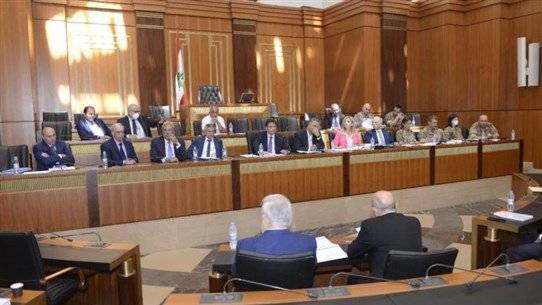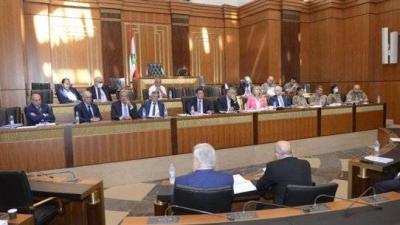The Finance and Budget Committee completed its review of the budget materials on Wednesday and will hold a session on Thursday to address the scenarios recently sent by the Ministry of Finance related to revenues and expenditures, as well as some outstanding items linked to the exchange rate. The committee met under the chairmanship of MP Ibrahim Kanaan, with the presence of Ministers of Finance Youssef Khalil, Justice Henry Khoury, and Defense Maurice Slim, along with representatives from the Ministry of Foreign Affairs to continue examining the budget materials within the framework of the draft law for the general budget and supplementary budgets for 2022.
Present were the MPs: Jean Talouzian, Ali Hassan Khalil, Hassan Fadlallah, Jihad Al-Samad, Raji Al-Saad, Alan Aoun, Ibrahim Meninmeh, Ayoub Hamid, Ghada Ayoub, Ghassan Hasbani, Bilal Abdullah, Jamil Sayyed, Adnan Tabbal, Mohammed Khawaja, Ashraf Beydoun, Ibrahim Al-Mousawi, and Qassem Hashem.
Also present were: Director of the Foreign Minister’s Office Walid Haidar, Director of Administrative and Financial Affairs at the Foreign Ministry Ambassador King Hajl, Defense Minister Advisor Carol Tamer, General Director of the Ministry of Justice Judge Mohammed Al-Masri, Acting General Director of the Ministry of Finance George Maaraoui, Director of Revenues at the Ministry of Finance Louai Hajj Shahada, Army Budget Planning Director Brigadier General Youssef Khoury Hanna, Army Budget Section Head Colonel Zahi Al-Shaar, Director of Administrative and Financial Affairs Colonel Hossam Al-Rifai, Intelligence Directorate Brigadier General Gloria Al-Sous, and Head of the Administrative Section in the Military Chamber Major Wajeed Khoury.
The committee approved the calculation of income tax for diplomats abroad based on their salary rather than allowances, due to the financial collapse affecting Lebanese diplomats abroad in relation to their living conditions and the expenses incurred for housing and children's education.
Regarding the judiciary, the committee established a fee of 50,000 Lebanese pounds on criminal complaints to support the judges' assistance fund.
For military personnel, the committee canceled provisions that prevent retirement referrals and those extending the years of service for officers, individuals, and military personnel, and amended some items related to exemptions from fees and incentives connected to the military institution.
The committee assured separate budget allocations for the military's health care from the total allocations designated for the Ministry of Health, and exempted the pension for the survivors of martyrs of the military and security forces and the pensions of injured members of these forces from income tax.
The committee approved that no fees should be levied on donations to the military institution and exempted goods directly imported by the military institution from a 3% stamped fee. Additionally, the committee canceled Article 132 related to increasing years of service for military personnel.
The committee approved the installment of debts owed to the state in favor of the National Social Security Fund, canceled the provision prohibiting the combination of pensions with supplemental allowances and incomes from any compensation or monthly or daily salary or any other payment from the state treasury or public institutions and municipalities.
The committee postponed the article on social assistance for further study in light of a proposal to convert it into a permanent increase in pensions, which will be approved after final revenue numbers are examined.
The committee approved the provision allowing a retiring administrative employee to terminate their service and benefit from end-of-service compensation for years of service of no less than 17 years.
Furthermore, the committee approved Article 141, which prohibits financing any project in the public sector through the budget via grants or any other source before preparing a detailed feasibility study for the project, followed by necessary evaluation and compliance after implementation.
The committee ratified Article 142, which allows the use of electronic payment methods and money transfer networks for paying fees collected by public administrations.




